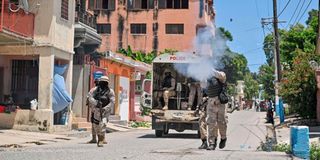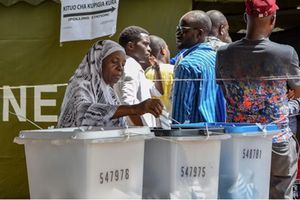Kenya demands $237m from UN for Haiti mission

A policeman lobs tear gas as people demonstrate over the rise in the cost of living in Petit-Goâve, Haiti on September 14, 2023. PHOTO | AFP
Kenya has demanded a funding vote of KSh36 billion ($237.55 million) to prepare its 1,000 troops to Haiti in an annual budgetary estimate, indicating the expense the international community must foot to run the Mission initially.
Interior Cabinet Secretary Kithure Kindiki told parliament this week that the amount will go towards preparations of the troops and buying of equipment. But it excludes any other country that may want to deploy, meaning the actual cost of the Haiti Multinational Security Support mission (MSS) as it is formally known could be higher.
Appearing before the joint security committee of both the National Assembly and Senate, that is conducting public participation over the matter, Prof Kindiki told MPs the money will go towards training, administration support, transport, purchase of technical equipment, general equipment and purchase of weapon, ammunition and anti-riot equipment.
“The cost of implementation of the mission shall be borne through voluntary contributions by United Nations member states and organisations to a trust fund,” Prof Kindiki told MPs.
At least ten other countries have signaled readiness to deploy personnel of various kinds, but it is the Kenyan police who will lead the mission which received approval from the UN Security Council in October. Other countries also in the mission include Senegal (350), Burundi (250), Chile, Jamaica, Ecuador, Barbados (200) and Seychelles will deploy 190 officers.
Senegal, Mongolia, Spain and Bahamas are among those who had expressed readiness. The US government had announced a funding pledge of $200 million while Canada had also pledged technical support.
Prof Kindiki said Kenya could spend from its coffers and be refunded by the United Nations Security Council.
Kenya’s acceptance to lead the mission had raised controversy in Kenya and Haiti. In Nairobi, a local lawyer sued the government seeking to halt it and the Courts froze any deployments until the case is heard.
Nonetheless, the government had gone on to finalise the procedures which include parliamentary approvals. In Haiti, some local movements warned against any new foreign interventions.
Since the 1920s, Haiti, which became the first black majority nation in the world to win independence, has been under some form of foreign intervention. But with 13 coups and seven assassinations of its leaders over the past century, the country’s security nightmare was worsened by the rise of gangs.
President Ruto has argued that Nairobi is consistent in seeking peace and that it is expressing responsibility on world stage by volunteering to send police there.
Prof Kindiki told the committee that the deployment of the 1,000 officers will not jeopardise the security of the country as there are enough officers that will remain locally to ensure the safety of Kenyans.
Prof Kindiki who appeared before the committee alongside Inspector General of Police Japhet Koome urged parliament to approve the deployment of the officers saying they have international obligation to engage in such missions.
Mr Koome told MPs that the officers that have been chosen for the mission are from different specialised units whom he expressed confidence that are up to task.
According to the breakdown, the 1,000 officers deployed to Haiti will be led one Assistant Inspector General who will be the overall mission commander, under him will be one commissioner of police that will be in charge of operation, one commissioner of police that will be the chief of staff and another that will be in charge of chief of logistics.
Mr Koome said the remaining 96 personnel of the headquarters team will be drawn from statcom, intelligence, investigations and other technical agencies.
The second layer of officers to be deployed in Haiti will be drawn from formed police unit who shall include five commanders, five deputy formed police unit commanders and 25 other officers drawn from support service officers, police intelligence officers, liaison officers and duty officers.
There will also be five platoon commanders with each five officers from each platoon and another 25 officers drawn from deputy platoon commanders, 25 sergeants and senior sergeants and another 135 corporals. There will also be 655 constables that will be deployed to the mission.
“We have carefully chosen these officers, taken them through interviews, checked their medical fitness and we are confident that they are fully prepared for the mission ahead,” Mr Koome told MPs.
“I want to urge parliament to allow us to deploy the officers to Haiti because what is going on in Haiti cannot be allowed to go on anymore. The violation of human rights going on there cannot be tolerated,” he added.
Mr Koome told MPs that the main task of Kenyan police officers will be to provide overall command, support Haiti police on operations and planning, capacity building of the Haiti police officers, and protect critical infrastructure in Haiti such as airports, ports, schools and health centres.
The Kenyan officers will also ensure safe access of humanitarian aid by Haitians, maintain basic law and order, make arrests and detention in full compliance of the law.
The lawmakers however poked holes in the deployment saying there are many gaps that are yet to be addressed.
In particular, MPs want the issue of insurance of the officers that will be deployed addressed, the number to be reduced to 500 officers and compensation put in place for families that will lose their loved ones in the mission.
Kisumu woman representative however opposed the deployment terming it a luxury that Kenya cannot afford at the moment.
“To me, sending 1,000 officers to Haiti is a luxury. There is no way we should deny Kenyans security for a country that is not even able to protect themselves,” Ms Buyu said.
The MPs also termed the deployment illegal, saying in the constitution only Kenya Defence Forces (KDF) can be deployed to such missions as stipulated in Article 243 of the constitution.
“The constitution does not permit police officers to be deployed to another country to maintain law and order. That is reserved for KDF,” said Homa Bay MP Peter Kaluma.
Nominated MP Karen Nyamu also opposed the deployment saying Kenyan officers are not the best trained in the world to be sent for such assignments.
“I’m sceptical about this deployment, other countries with more trained officers have withdrawn their officers. We should be cautious on this,” Ms Nyamu said.
The committee said it will meet other stakeholders before retreating to write its report that will be tabled in parliament in order for MPs to make formal approval or rejection of the deployment.



